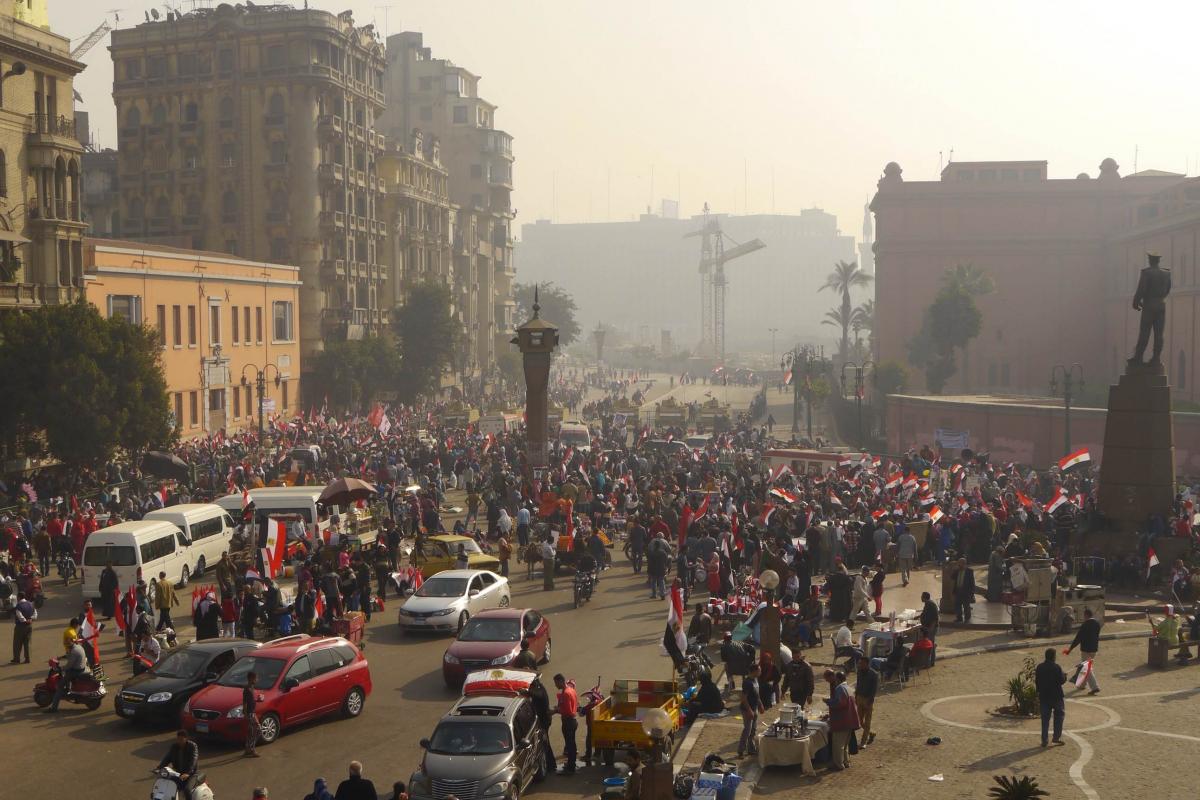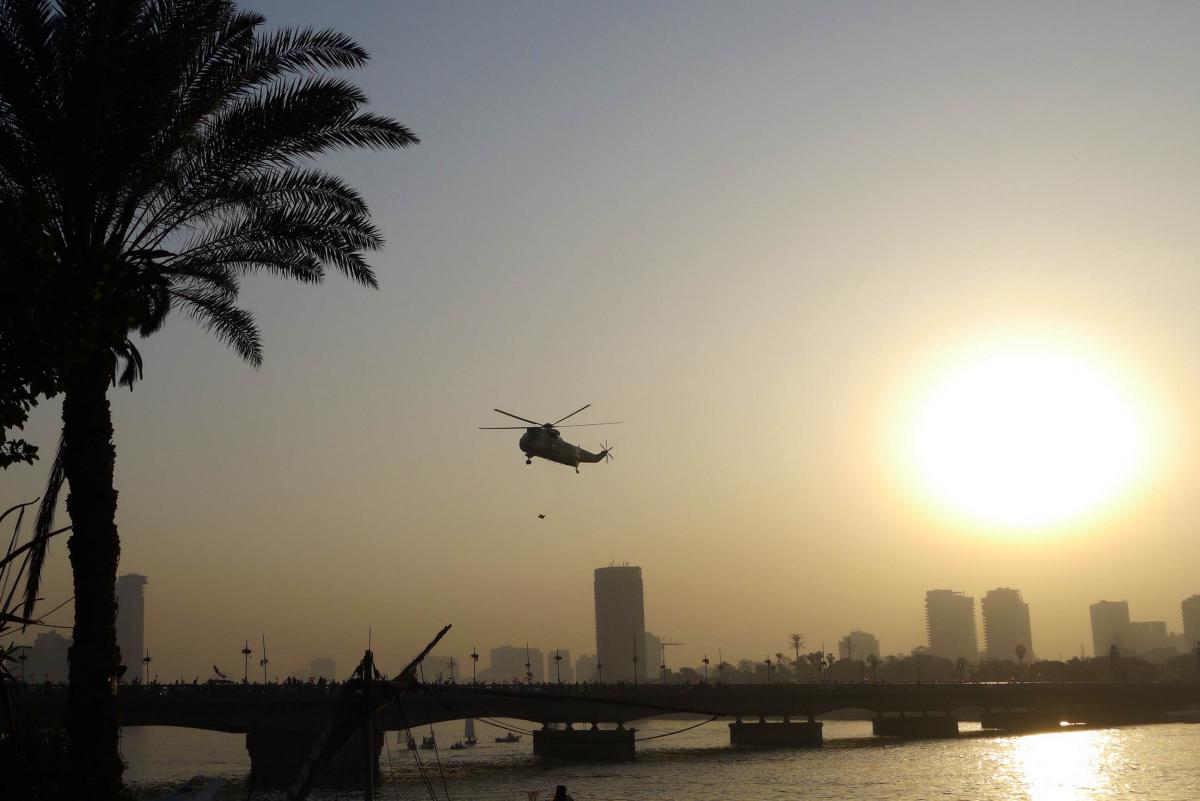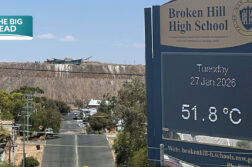Cairo woke on 25 January to the growl of a fat-bodied Chinook helicopter making low, slow loops over the city centre. High overhead, vapour trails of almost-invisible F16s crisscrossed a sky tinted brown by the thick winter smog.
Both were an explicit declaration of who is in charge now, on the third anniversary of the 18 days in 2011 that brought down Hosni Mubarak.
The day was, for many, a joyous celebration of General Abdel Fattah al-Sisi and the once-hated military that backs him. Two days later, the country's top military council endorsed Sisi as the nation's next president.
Thoughout the afternoon and evening groups of revellers danced through the streets of downtown Cairo to the sound of pro-military anthem Teslam el Ayadi towards the famous Midan Tahrir, awash with flags and repetitive pro-regime chants.
Around mid-afternoon, at the other end of the main artery that connects Tahrir square with downtown's northern reaches, a 500-strong peaceful pro-democracy protest was ruthlessly put down by police, as were over a dozen other demonstrations held during the day.
Two days later Sisi was promoted to Field Marshal, a title usually reserved for a general with wartime victories to his credit (Sisi hasn't fought in or led any battles), and gifted with the army's blessing to run for president.
It's in this atmosphere of hero-worship and military boosterism, where activists are being imprisoned without charge for campaigning against the government and people are beaten up on the street for looking "Islamist", that the revolutionaries of 2011 are beginning to reassess and reorganise.

The downtown protest on Saturday was organised by the Revolutionary Path Front: a combination of the Revolutionary Socialists and 6 April Youth Movement. Both groups were at the forefront of events in 2011 and it was a powerful signal that Egypt's secular activists have got their mojo back.
Revolutionary Socialist spokesman Tarek Shalaby said the group was evolving towards a more mature, more effective political platform than that of 2011.
"We're a lot more organised than we were three years ago. Are we as organised as we should be? Probably not, but there's a lot of reasons for that," he said, listing grassroots mobilisation and organisation as areas they were building on.
The need to work smart by spreading information and gaining new members, rather than simply protesting on the streets is becoming more important than ever.
"It's hard when you're right in the middle of the police, and the police are firing live ammunition at us just because we are chanting, we are making chants that they don't approve of," Shalaby said.
"Then you are under threat to be actually caught by the police, or caught by people who think that they'd be doing this country a service by beating you up and taking you to the authorities … There is no gain and there is nothing heroic about doing time in prison."

Later on Saturday afternoon Ahmed Ezzat, a human rights lawyer and director of his NGO Association for Freedom of Thought and Expression (AFTE), prepared for a long night in his spartan office. His phone barely stopped ringing while he painstakingly two-finger typed the names of the 1079 arrested and the at least 64 killed that day into an AFTE statement.
Ezzat said free speech and human rights abuses were worse now than after the 30 June Tamarod (rebel) mass protest, but here was also an opportunity for activists to evolve their tactics and create the mature political organisations that were lacking in 2011.
"The revolutionaries have to organise themselves more than ever now and to read the reality. To start to build parties and civil society organisations on the ground to document — and this is the important thing — to document all the violations (of) human rights committed by the counter-revolution."
"Over time we have the opportunity for victory but this needs to be more smart, to be more organised," he said. "The state is very organised and the Muslim Brothers, Islamists are organised, but the revolutionaries are not organised enough and this is what we need now."
In strong agreement is Washington Institute for Near East Policy fellow Adel El-Adawy, who wrote in the Daily News Egypt newspaper that protesting had become the goal rather than the means to an end. Grassroots movements needed to transition from "the informal politics of the square to the formal politics of the ballot box", he wrote.
"The people have broken the barrier of fear and a full-fledged authoritarian relapse in Egypt is improbable. The 25 January and 30 June revolutions stand as proof to the power of the people. Whoever will govern Egypt in the coming years will think twice before underestimating the power of his own people."

Human rights advocate and lawyer Hafsa Halawa isn't as positive. She puts the day of a "true democracy" in Egypt a long way in the future.
Helping the government push its message of fear and need for a protective strongman were low-level insurgencies, such as that of Sinai militant group Ansar Beit Al-Maqdes which claimed responsibility for shooting down a military helicopter in North Sinai on Saturday and the bomb attacks in Cairo on Friday.
This fearmongering and public vilification of Islamists made it hard to gather support for democracy rather than a powerful strongman.
"There is no voice amongst secular activists to bring the Brotherhood and their supporters back into the fold. Even amongst those principled voices, reconciliation is not a word that is used. It is primarily the fault of the selective and partisan approach to democracy that this country has taken," she said.
"People must find a way to bring these isolated Islamist supporters back into the fold and understand their place and role in Egyptian society."
In the meantime, Ezzat, Shalaby and their fellow activists are up against a machine that will brook little opposition.
More arrests were made on Saturday than during the bloody crackdown on the sit-ins on 14 August, and more people died than on the same day in 2011, 2012 and 2013 combined. But, as Ezzat said, "This is not the end."
Donate To New Matilda
New Matilda is a small, independent media outlet. We survive through reader contributions, and never losing a lawsuit. If you got something from this article, giving something back helps us to continue speaking truth to power. Every little bit counts.



